Leadership: An Evolution Over the Past Decade and Its Impact
VerifiedAdded on 2022/01/18
|7
|2082
|238
Essay
AI Summary
This essay provides a comprehensive overview of the evolution of leadership over the past decade, highlighting the significant shifts in leadership styles, particularly the transition from authoritarian to more collaborative and empowering approaches. It examines the impact of technological advancements and remote work on leadership dynamics, emphasizing the need for adaptability and flexibility in modern leaders. The essay discusses the rise of synergistic management-employee participation, the importance of employee engagement, and the influence of character recognition tools. It contrasts the leadership styles of the past, characterized by top-down decision-making, with the current emphasis on employee empowerment and the utilization of individual strengths. The analysis covers the historical context of leadership, including the emergence of economic and scientific leaders, and the impact of societal changes on leadership traits. The conclusion emphasizes the need for leaders to be attentive to technological impacts and adaptable to the changing business landscape, which requires a shift from traditional command-and-control models towards more collaborative and human-centric leadership styles.
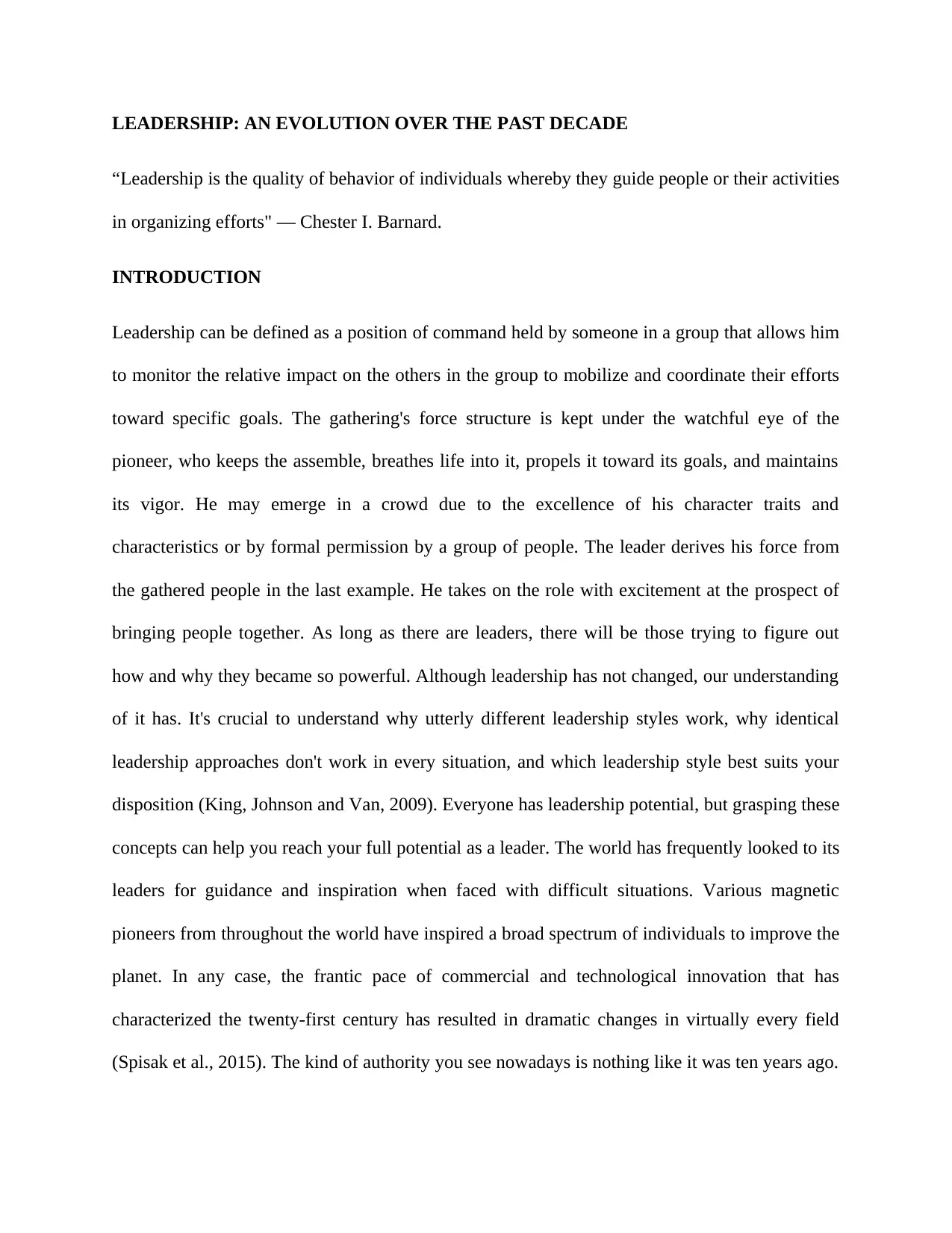
LEADERSHIP: AN EVOLUTION OVER THE PAST DECADE
“Leadership is the quality of behavior of individuals whereby they guide people or their activities
in organizing efforts" — Chester I. Barnard.
INTRODUCTION
Leadership can be defined as a position of command held by someone in a group that allows him
to monitor the relative impact on the others in the group to mobilize and coordinate their efforts
toward specific goals. The gathering's force structure is kept under the watchful eye of the
pioneer, who keeps the assemble, breathes life into it, propels it toward its goals, and maintains
its vigor. He may emerge in a crowd due to the excellence of his character traits and
characteristics or by formal permission by a group of people. The leader derives his force from
the gathered people in the last example. He takes on the role with excitement at the prospect of
bringing people together. As long as there are leaders, there will be those trying to figure out
how and why they became so powerful. Although leadership has not changed, our understanding
of it has. It's crucial to understand why utterly different leadership styles work, why identical
leadership approaches don't work in every situation, and which leadership style best suits your
disposition (King, Johnson and Van, 2009). Everyone has leadership potential, but grasping these
concepts can help you reach your full potential as a leader. The world has frequently looked to its
leaders for guidance and inspiration when faced with difficult situations. Various magnetic
pioneers from throughout the world have inspired a broad spectrum of individuals to improve the
planet. In any case, the frantic pace of commercial and technological innovation that has
characterized the twenty-first century has resulted in dramatic changes in virtually every field
(Spisak et al., 2015). The kind of authority you see nowadays is nothing like it was ten years ago.
“Leadership is the quality of behavior of individuals whereby they guide people or their activities
in organizing efforts" — Chester I. Barnard.
INTRODUCTION
Leadership can be defined as a position of command held by someone in a group that allows him
to monitor the relative impact on the others in the group to mobilize and coordinate their efforts
toward specific goals. The gathering's force structure is kept under the watchful eye of the
pioneer, who keeps the assemble, breathes life into it, propels it toward its goals, and maintains
its vigor. He may emerge in a crowd due to the excellence of his character traits and
characteristics or by formal permission by a group of people. The leader derives his force from
the gathered people in the last example. He takes on the role with excitement at the prospect of
bringing people together. As long as there are leaders, there will be those trying to figure out
how and why they became so powerful. Although leadership has not changed, our understanding
of it has. It's crucial to understand why utterly different leadership styles work, why identical
leadership approaches don't work in every situation, and which leadership style best suits your
disposition (King, Johnson and Van, 2009). Everyone has leadership potential, but grasping these
concepts can help you reach your full potential as a leader. The world has frequently looked to its
leaders for guidance and inspiration when faced with difficult situations. Various magnetic
pioneers from throughout the world have inspired a broad spectrum of individuals to improve the
planet. In any case, the frantic pace of commercial and technological innovation that has
characterized the twenty-first century has resulted in dramatic changes in virtually every field
(Spisak et al., 2015). The kind of authority you see nowadays is nothing like it was ten years ago.
Paraphrase This Document
Need a fresh take? Get an instant paraphrase of this document with our AI Paraphraser
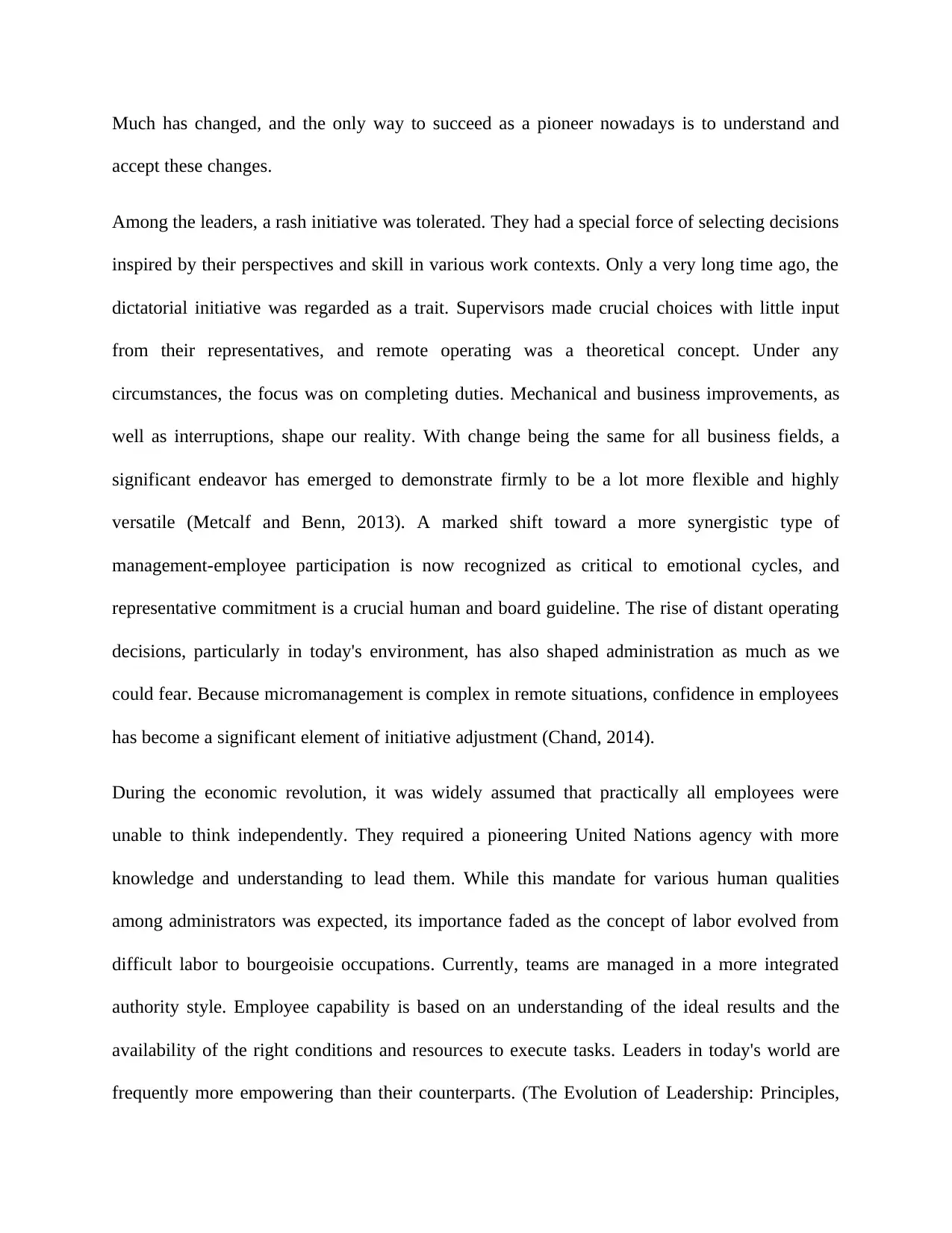
Much has changed, and the only way to succeed as a pioneer nowadays is to understand and
accept these changes.
Among the leaders, a rash initiative was tolerated. They had a special force of selecting decisions
inspired by their perspectives and skill in various work contexts. Only a very long time ago, the
dictatorial initiative was regarded as a trait. Supervisors made crucial choices with little input
from their representatives, and remote operating was a theoretical concept. Under any
circumstances, the focus was on completing duties. Mechanical and business improvements, as
well as interruptions, shape our reality. With change being the same for all business fields, a
significant endeavor has emerged to demonstrate firmly to be a lot more flexible and highly
versatile (Metcalf and Benn, 2013). A marked shift toward a more synergistic type of
management-employee participation is now recognized as critical to emotional cycles, and
representative commitment is a crucial human and board guideline. The rise of distant operating
decisions, particularly in today's environment, has also shaped administration as much as we
could fear. Because micromanagement is complex in remote situations, confidence in employees
has become a significant element of initiative adjustment (Chand, 2014).
During the economic revolution, it was widely assumed that practically all employees were
unable to think independently. They required a pioneering United Nations agency with more
knowledge and understanding to lead them. While this mandate for various human qualities
among administrators was expected, its importance faded as the concept of labor evolved from
difficult labor to bourgeoisie occupations. Currently, teams are managed in a more integrated
authority style. Employee capability is based on an understanding of the ideal results and the
availability of the right conditions and resources to execute tasks. Leaders in today's world are
frequently more empowering than their counterparts. (The Evolution of Leadership: Principles,
accept these changes.
Among the leaders, a rash initiative was tolerated. They had a special force of selecting decisions
inspired by their perspectives and skill in various work contexts. Only a very long time ago, the
dictatorial initiative was regarded as a trait. Supervisors made crucial choices with little input
from their representatives, and remote operating was a theoretical concept. Under any
circumstances, the focus was on completing duties. Mechanical and business improvements, as
well as interruptions, shape our reality. With change being the same for all business fields, a
significant endeavor has emerged to demonstrate firmly to be a lot more flexible and highly
versatile (Metcalf and Benn, 2013). A marked shift toward a more synergistic type of
management-employee participation is now recognized as critical to emotional cycles, and
representative commitment is a crucial human and board guideline. The rise of distant operating
decisions, particularly in today's environment, has also shaped administration as much as we
could fear. Because micromanagement is complex in remote situations, confidence in employees
has become a significant element of initiative adjustment (Chand, 2014).
During the economic revolution, it was widely assumed that practically all employees were
unable to think independently. They required a pioneering United Nations agency with more
knowledge and understanding to lead them. While this mandate for various human qualities
among administrators was expected, its importance faded as the concept of labor evolved from
difficult labor to bourgeoisie occupations. Currently, teams are managed in a more integrated
authority style. Employee capability is based on an understanding of the ideal results and the
availability of the right conditions and resources to execute tasks. Leaders in today's world are
frequently more empowering than their counterparts. (The Evolution of Leadership: Principles,
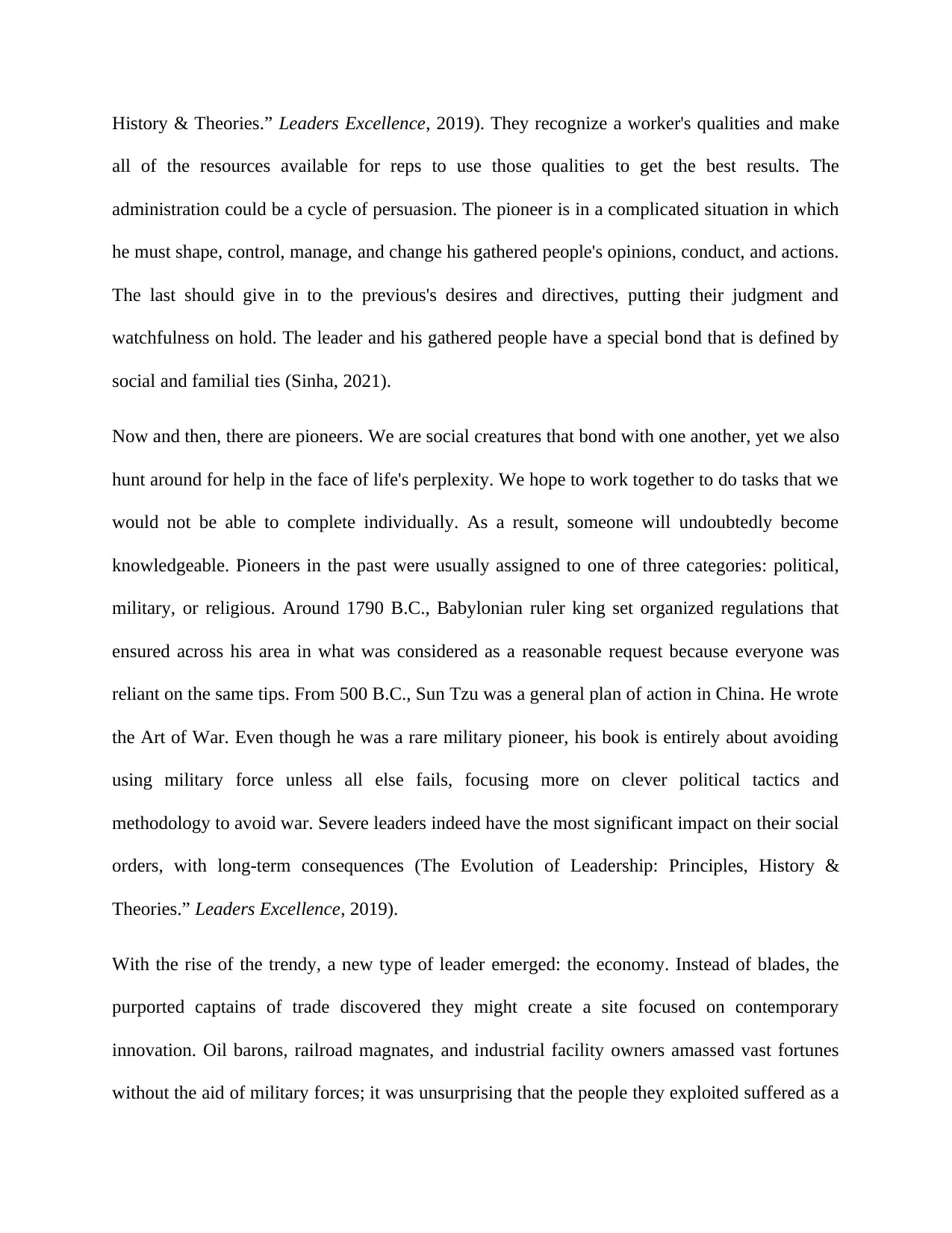
History & Theories.” Leaders Excellence, 2019). They recognize a worker's qualities and make
all of the resources available for reps to use those qualities to get the best results. The
administration could be a cycle of persuasion. The pioneer is in a complicated situation in which
he must shape, control, manage, and change his gathered people's opinions, conduct, and actions.
The last should give in to the previous's desires and directives, putting their judgment and
watchfulness on hold. The leader and his gathered people have a special bond that is defined by
social and familial ties (Sinha, 2021).
Now and then, there are pioneers. We are social creatures that bond with one another, yet we also
hunt around for help in the face of life's perplexity. We hope to work together to do tasks that we
would not be able to complete individually. As a result, someone will undoubtedly become
knowledgeable. Pioneers in the past were usually assigned to one of three categories: political,
military, or religious. Around 1790 B.C., Babylonian ruler king set organized regulations that
ensured across his area in what was considered as a reasonable request because everyone was
reliant on the same tips. From 500 B.C., Sun Tzu was a general plan of action in China. He wrote
the Art of War. Even though he was a rare military pioneer, his book is entirely about avoiding
using military force unless all else fails, focusing more on clever political tactics and
methodology to avoid war. Severe leaders indeed have the most significant impact on their social
orders, with long-term consequences (The Evolution of Leadership: Principles, History &
Theories.” Leaders Excellence, 2019).
With the rise of the trendy, a new type of leader emerged: the economy. Instead of blades, the
purported captains of trade discovered they might create a site focused on contemporary
innovation. Oil barons, railroad magnates, and industrial facility owners amassed vast fortunes
without the aid of military forces; it was unsurprising that the people they exploited suffered as a
all of the resources available for reps to use those qualities to get the best results. The
administration could be a cycle of persuasion. The pioneer is in a complicated situation in which
he must shape, control, manage, and change his gathered people's opinions, conduct, and actions.
The last should give in to the previous's desires and directives, putting their judgment and
watchfulness on hold. The leader and his gathered people have a special bond that is defined by
social and familial ties (Sinha, 2021).
Now and then, there are pioneers. We are social creatures that bond with one another, yet we also
hunt around for help in the face of life's perplexity. We hope to work together to do tasks that we
would not be able to complete individually. As a result, someone will undoubtedly become
knowledgeable. Pioneers in the past were usually assigned to one of three categories: political,
military, or religious. Around 1790 B.C., Babylonian ruler king set organized regulations that
ensured across his area in what was considered as a reasonable request because everyone was
reliant on the same tips. From 500 B.C., Sun Tzu was a general plan of action in China. He wrote
the Art of War. Even though he was a rare military pioneer, his book is entirely about avoiding
using military force unless all else fails, focusing more on clever political tactics and
methodology to avoid war. Severe leaders indeed have the most significant impact on their social
orders, with long-term consequences (The Evolution of Leadership: Principles, History &
Theories.” Leaders Excellence, 2019).
With the rise of the trendy, a new type of leader emerged: the economy. Instead of blades, the
purported captains of trade discovered they might create a site focused on contemporary
innovation. Oil barons, railroad magnates, and industrial facility owners amassed vast fortunes
without the aid of military forces; it was unsurprising that the people they exploited suffered as a
⊘ This is a preview!⊘
Do you want full access?
Subscribe today to unlock all pages.

Trusted by 1+ million students worldwide
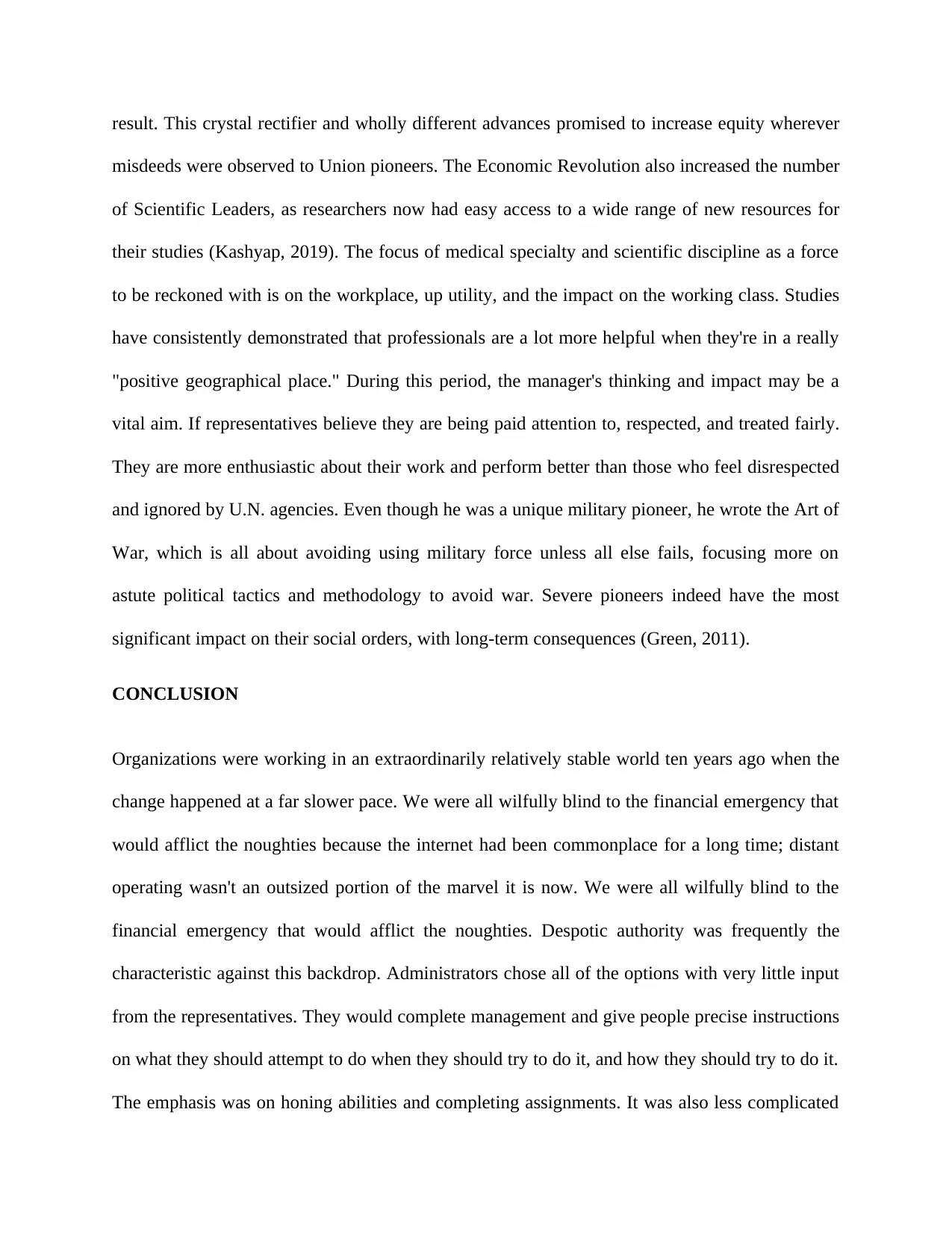
result. This crystal rectifier and wholly different advances promised to increase equity wherever
misdeeds were observed to Union pioneers. The Economic Revolution also increased the number
of Scientific Leaders, as researchers now had easy access to a wide range of new resources for
their studies (Kashyap, 2019). The focus of medical specialty and scientific discipline as a force
to be reckoned with is on the workplace, up utility, and the impact on the working class. Studies
have consistently demonstrated that professionals are a lot more helpful when they're in a really
"positive geographical place." During this period, the manager's thinking and impact may be a
vital aim. If representatives believe they are being paid attention to, respected, and treated fairly.
They are more enthusiastic about their work and perform better than those who feel disrespected
and ignored by U.N. agencies. Even though he was a unique military pioneer, he wrote the Art of
War, which is all about avoiding using military force unless all else fails, focusing more on
astute political tactics and methodology to avoid war. Severe pioneers indeed have the most
significant impact on their social orders, with long-term consequences (Green, 2011).
CONCLUSION
Organizations were working in an extraordinarily relatively stable world ten years ago when the
change happened at a far slower pace. We were all wilfully blind to the financial emergency that
would afflict the noughties because the internet had been commonplace for a long time; distant
operating wasn't an outsized portion of the marvel it is now. We were all wilfully blind to the
financial emergency that would afflict the noughties. Despotic authority was frequently the
characteristic against this backdrop. Administrators chose all of the options with very little input
from the representatives. They would complete management and give people precise instructions
on what they should attempt to do when they should try to do it, and how they should try to do it.
The emphasis was on honing abilities and completing assignments. It was also less complicated
misdeeds were observed to Union pioneers. The Economic Revolution also increased the number
of Scientific Leaders, as researchers now had easy access to a wide range of new resources for
their studies (Kashyap, 2019). The focus of medical specialty and scientific discipline as a force
to be reckoned with is on the workplace, up utility, and the impact on the working class. Studies
have consistently demonstrated that professionals are a lot more helpful when they're in a really
"positive geographical place." During this period, the manager's thinking and impact may be a
vital aim. If representatives believe they are being paid attention to, respected, and treated fairly.
They are more enthusiastic about their work and perform better than those who feel disrespected
and ignored by U.N. agencies. Even though he was a unique military pioneer, he wrote the Art of
War, which is all about avoiding using military force unless all else fails, focusing more on
astute political tactics and methodology to avoid war. Severe pioneers indeed have the most
significant impact on their social orders, with long-term consequences (Green, 2011).
CONCLUSION
Organizations were working in an extraordinarily relatively stable world ten years ago when the
change happened at a far slower pace. We were all wilfully blind to the financial emergency that
would afflict the noughties because the internet had been commonplace for a long time; distant
operating wasn't an outsized portion of the marvel it is now. We were all wilfully blind to the
financial emergency that would afflict the noughties. Despotic authority was frequently the
characteristic against this backdrop. Administrators chose all of the options with very little input
from the representatives. They would complete management and give people precise instructions
on what they should attempt to do when they should try to do it, and how they should try to do it.
The emphasis was on honing abilities and completing assignments. It was also less complicated
Paraphrase This Document
Need a fresh take? Get an instant paraphrase of this document with our AI Paraphraser
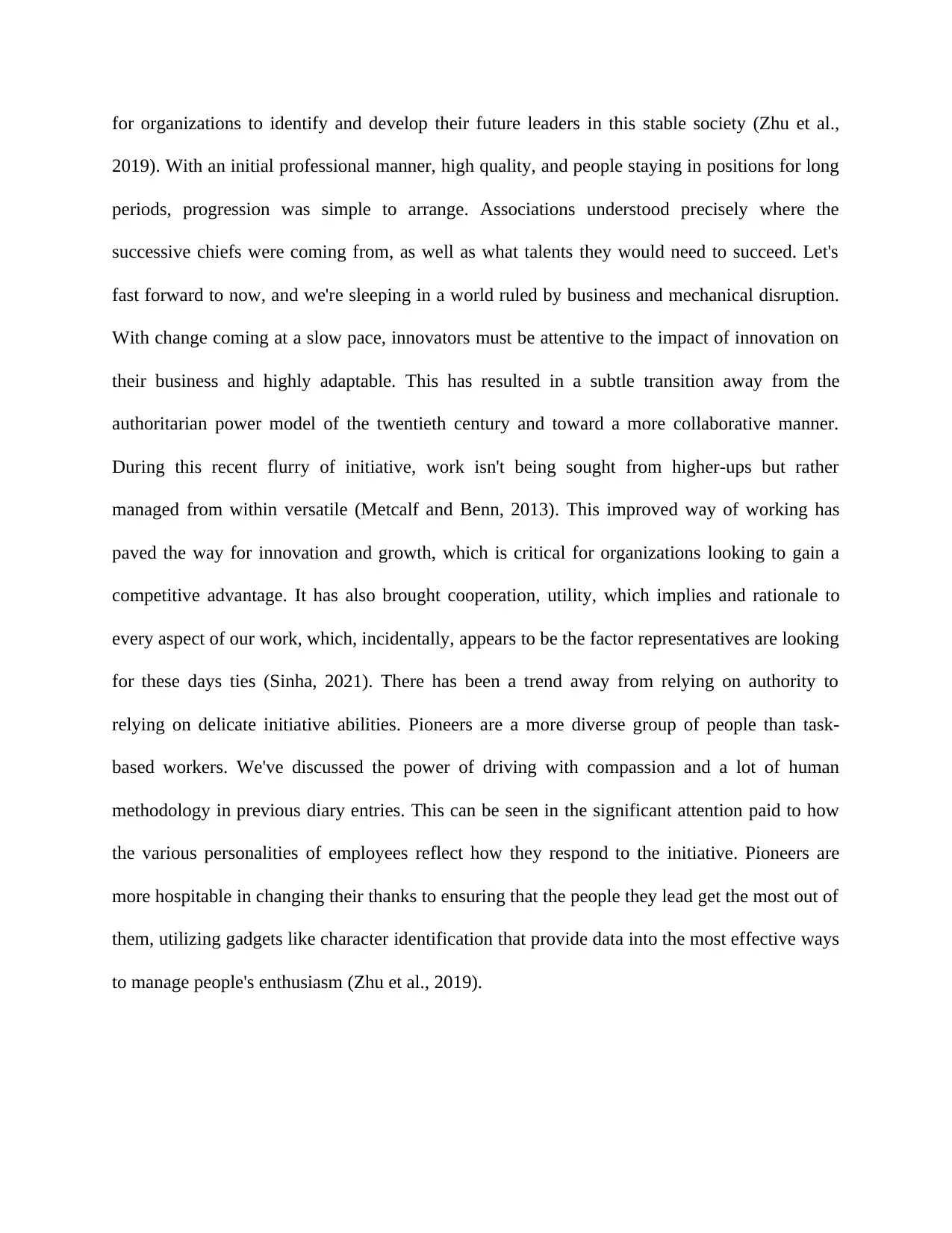
for organizations to identify and develop their future leaders in this stable society (Zhu et al.,
2019). With an initial professional manner, high quality, and people staying in positions for long
periods, progression was simple to arrange. Associations understood precisely where the
successive chiefs were coming from, as well as what talents they would need to succeed. Let's
fast forward to now, and we're sleeping in a world ruled by business and mechanical disruption.
With change coming at a slow pace, innovators must be attentive to the impact of innovation on
their business and highly adaptable. This has resulted in a subtle transition away from the
authoritarian power model of the twentieth century and toward a more collaborative manner.
During this recent flurry of initiative, work isn't being sought from higher-ups but rather
managed from within versatile (Metcalf and Benn, 2013). This improved way of working has
paved the way for innovation and growth, which is critical for organizations looking to gain a
competitive advantage. It has also brought cooperation, utility, which implies and rationale to
every aspect of our work, which, incidentally, appears to be the factor representatives are looking
for these days ties (Sinha, 2021). There has been a trend away from relying on authority to
relying on delicate initiative abilities. Pioneers are a more diverse group of people than task-
based workers. We've discussed the power of driving with compassion and a lot of human
methodology in previous diary entries. This can be seen in the significant attention paid to how
the various personalities of employees reflect how they respond to the initiative. Pioneers are
more hospitable in changing their thanks to ensuring that the people they lead get the most out of
them, utilizing gadgets like character identification that provide data into the most effective ways
to manage people's enthusiasm (Zhu et al., 2019).
2019). With an initial professional manner, high quality, and people staying in positions for long
periods, progression was simple to arrange. Associations understood precisely where the
successive chiefs were coming from, as well as what talents they would need to succeed. Let's
fast forward to now, and we're sleeping in a world ruled by business and mechanical disruption.
With change coming at a slow pace, innovators must be attentive to the impact of innovation on
their business and highly adaptable. This has resulted in a subtle transition away from the
authoritarian power model of the twentieth century and toward a more collaborative manner.
During this recent flurry of initiative, work isn't being sought from higher-ups but rather
managed from within versatile (Metcalf and Benn, 2013). This improved way of working has
paved the way for innovation and growth, which is critical for organizations looking to gain a
competitive advantage. It has also brought cooperation, utility, which implies and rationale to
every aspect of our work, which, incidentally, appears to be the factor representatives are looking
for these days ties (Sinha, 2021). There has been a trend away from relying on authority to
relying on delicate initiative abilities. Pioneers are a more diverse group of people than task-
based workers. We've discussed the power of driving with compassion and a lot of human
methodology in previous diary entries. This can be seen in the significant attention paid to how
the various personalities of employees reflect how they respond to the initiative. Pioneers are
more hospitable in changing their thanks to ensuring that the people they lead get the most out of
them, utilizing gadgets like character identification that provide data into the most effective ways
to manage people's enthusiasm (Zhu et al., 2019).
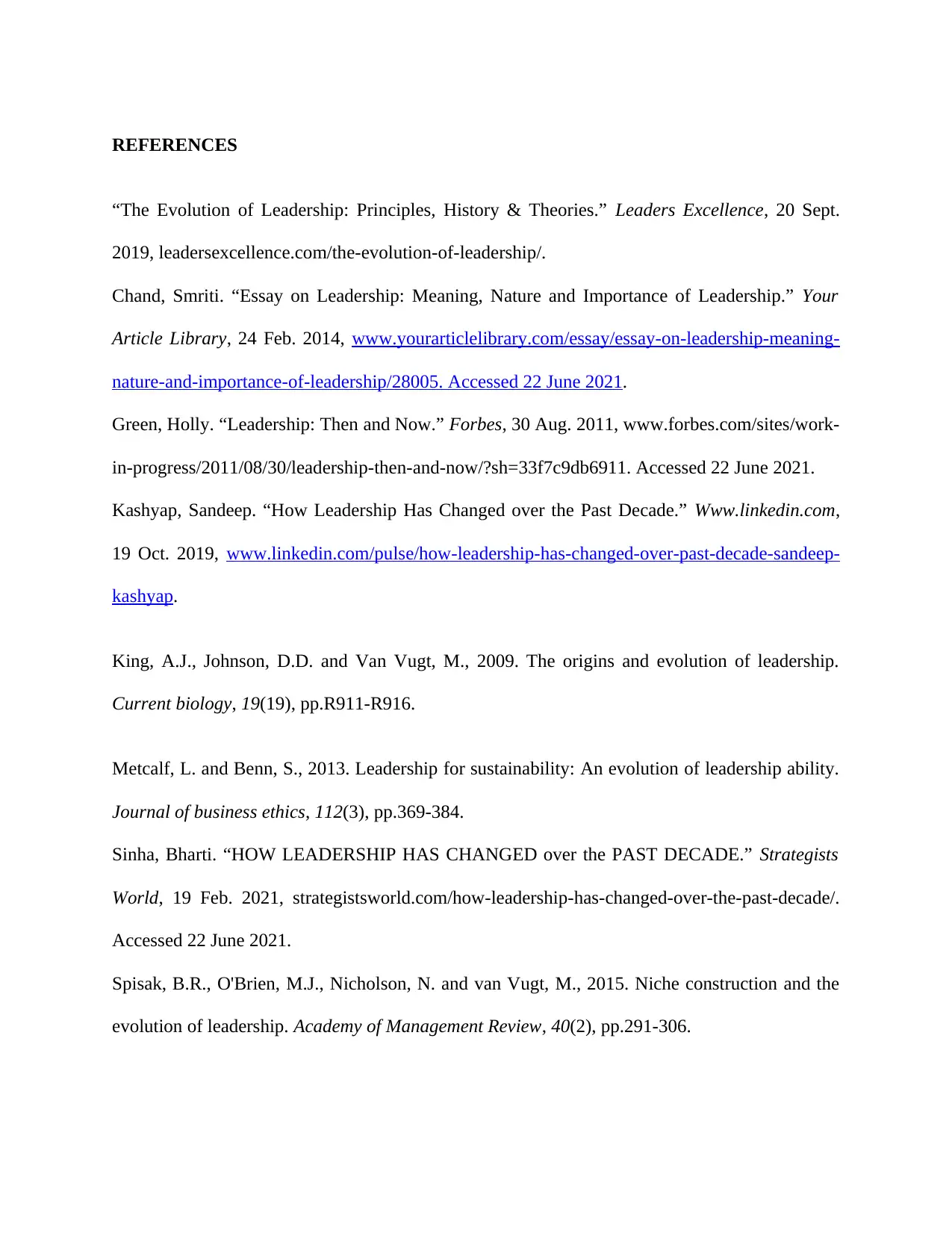
REFERENCES
“The Evolution of Leadership: Principles, History & Theories.” Leaders Excellence, 20 Sept.
2019, leadersexcellence.com/the-evolution-of-leadership/.
Chand, Smriti. “Essay on Leadership: Meaning, Nature and Importance of Leadership.” Your
Article Library, 24 Feb. 2014, www.yourarticlelibrary.com/essay/essay-on-leadership-meaning-
nature-and-importance-of-leadership/28005. Accessed 22 June 2021.
Green, Holly. “Leadership: Then and Now.” Forbes, 30 Aug. 2011, www.forbes.com/sites/work-
in-progress/2011/08/30/leadership-then-and-now/?sh=33f7c9db6911. Accessed 22 June 2021.
Kashyap, Sandeep. “How Leadership Has Changed over the Past Decade.” Www.linkedin.com,
19 Oct. 2019, www.linkedin.com/pulse/how-leadership-has-changed-over-past-decade-sandeep-
kashyap.
King, A.J., Johnson, D.D. and Van Vugt, M., 2009. The origins and evolution of leadership.
Current biology, 19(19), pp.R911-R916.
Metcalf, L. and Benn, S., 2013. Leadership for sustainability: An evolution of leadership ability.
Journal of business ethics, 112(3), pp.369-384.
Sinha, Bharti. “HOW LEADERSHIP HAS CHANGED over the PAST DECADE.” Strategists
World, 19 Feb. 2021, strategistsworld.com/how-leadership-has-changed-over-the-past-decade/.
Accessed 22 June 2021.
Spisak, B.R., O'Brien, M.J., Nicholson, N. and van Vugt, M., 2015. Niche construction and the
evolution of leadership. Academy of Management Review, 40(2), pp.291-306.
“The Evolution of Leadership: Principles, History & Theories.” Leaders Excellence, 20 Sept.
2019, leadersexcellence.com/the-evolution-of-leadership/.
Chand, Smriti. “Essay on Leadership: Meaning, Nature and Importance of Leadership.” Your
Article Library, 24 Feb. 2014, www.yourarticlelibrary.com/essay/essay-on-leadership-meaning-
nature-and-importance-of-leadership/28005. Accessed 22 June 2021.
Green, Holly. “Leadership: Then and Now.” Forbes, 30 Aug. 2011, www.forbes.com/sites/work-
in-progress/2011/08/30/leadership-then-and-now/?sh=33f7c9db6911. Accessed 22 June 2021.
Kashyap, Sandeep. “How Leadership Has Changed over the Past Decade.” Www.linkedin.com,
19 Oct. 2019, www.linkedin.com/pulse/how-leadership-has-changed-over-past-decade-sandeep-
kashyap.
King, A.J., Johnson, D.D. and Van Vugt, M., 2009. The origins and evolution of leadership.
Current biology, 19(19), pp.R911-R916.
Metcalf, L. and Benn, S., 2013. Leadership for sustainability: An evolution of leadership ability.
Journal of business ethics, 112(3), pp.369-384.
Sinha, Bharti. “HOW LEADERSHIP HAS CHANGED over the PAST DECADE.” Strategists
World, 19 Feb. 2021, strategistsworld.com/how-leadership-has-changed-over-the-past-decade/.
Accessed 22 June 2021.
Spisak, B.R., O'Brien, M.J., Nicholson, N. and van Vugt, M., 2015. Niche construction and the
evolution of leadership. Academy of Management Review, 40(2), pp.291-306.
⊘ This is a preview!⊘
Do you want full access?
Subscribe today to unlock all pages.

Trusted by 1+ million students worldwide
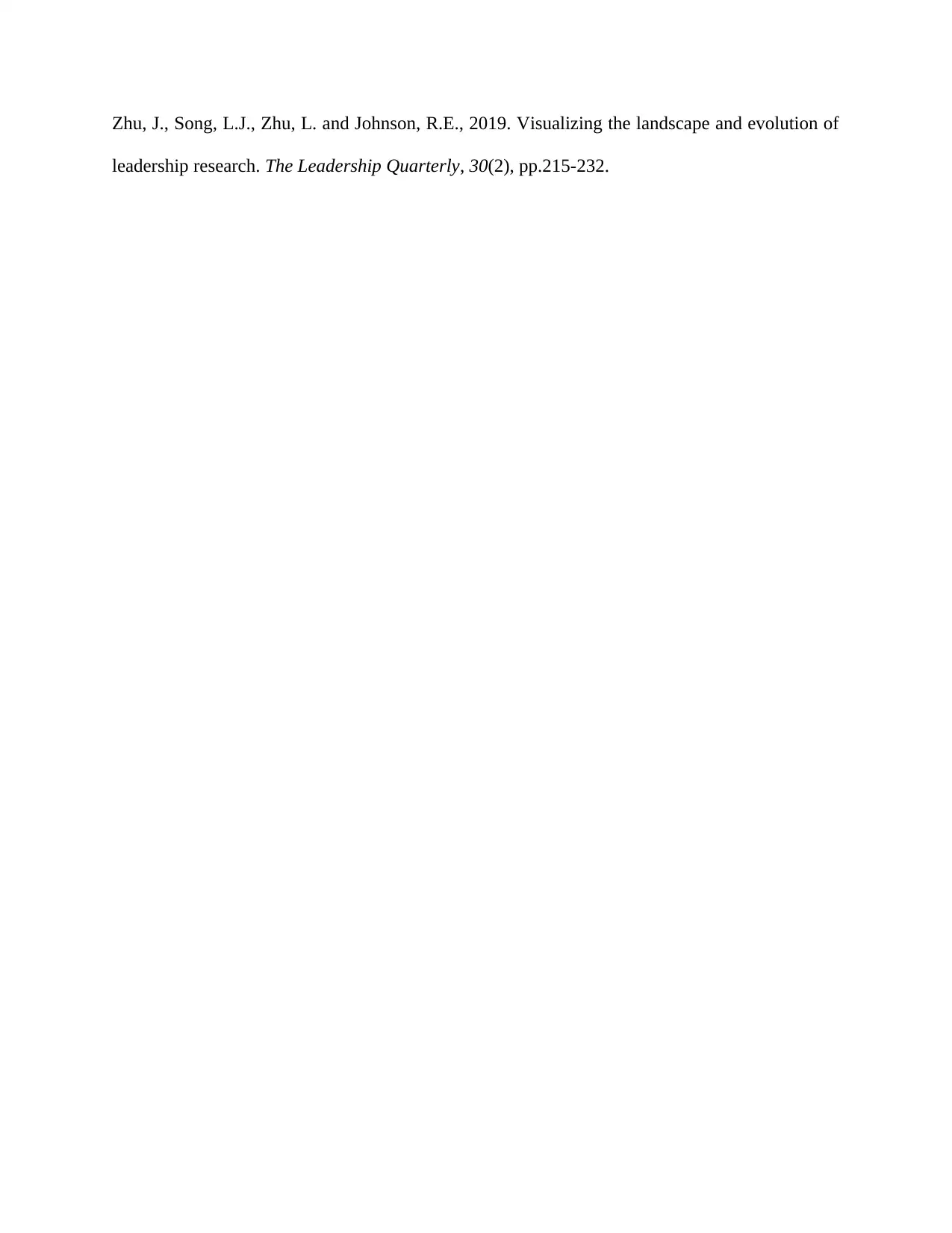
Zhu, J., Song, L.J., Zhu, L. and Johnson, R.E., 2019. Visualizing the landscape and evolution of
leadership research. The Leadership Quarterly, 30(2), pp.215-232.
leadership research. The Leadership Quarterly, 30(2), pp.215-232.
1 out of 7
Related Documents
Your All-in-One AI-Powered Toolkit for Academic Success.
+13062052269
info@desklib.com
Available 24*7 on WhatsApp / Email
![[object Object]](/_next/static/media/star-bottom.7253800d.svg)
Unlock your academic potential
Copyright © 2020–2026 A2Z Services. All Rights Reserved. Developed and managed by ZUCOL.





